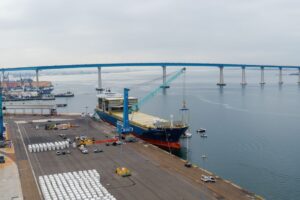On a mission to deliver Thailand as a key logistics hub operating across Asia, the Thai International Freight Forwarder Association (TIFFA) brings together the key players within the country’s freight forwarding industry under one governing body to build regional growth and strengthen the country’s role as a cargo shipping partner of choice. With operations spanning more than 35 years, TIFFA focuses on networking, education and industry development to ensure that every member operating under the association meets the highest standards in the freight forwarding sector to deliver Thailand as a leading logistics hub operating across the Association of Southeast Asian Nations (ASEAN).
Check out the article in the magazine below:
TIFFA was established in March 1987 by a group of freight forwarders operating across the country who saw the need for a fixed body that could help deliver more regulation, structure and reliability for the country’s freight forwarding industry. This need for a governing body was so crucial, as previous to the establishment of TIFFA, Thailand had seen a vast surge in cargo imports and exports across the country; however, the freight forwarding activities were not well recognised and instead were viewed as a kind of brokerage service from the perspective of the government and private sectors. Therefore, the original members of the association submitted the proposal for a freight forwarders association to the Board of Trade in Thailand (BoT), which was fully supported and then registered with the Ministry of Commerce. After this registration, TIFFA was officially inaugurated in March 1987 and saw an increase in members joining the association over the coming years.
The establishment of TIFFA was vital for many industries across Thailand, including the electronics, agriculture, furniture, and manufacturing sectors, which all relied heavily on the reliable movement of goods both across Thailand and international markets for the country’s economy. However, one of the most vital industries that TIFFA benefited is the automotive industry of Thailand, which saw many car parts arriving in the country from overseas, which would then be assembled in Thailand and sent throughout the country via freight links to ports for international shipping. Therefore, as the automotive industry was so lucrative for Thailand, the founding freight forwarding companies of TIFFA needed a way to ensure that the movement of such valuable cargo was supported by the same regulatory standards seen across the world, to ensure its exports remained competitive in global markets.
Today, TIFFA is home to over 250 members, ranging from ordinary to association members. TIFFA members all have the same combined goal of developing the country’s freight forwarding industry to keep cargo moving throughout Thailand and onto end markets through seamless supply chains. Since its establishment, TIFFA has continued to benefit Thailand, providing essential structure, regulation and support to its members. Ordinary members gain access to utilisation of the TIFFA logo to signify their role with the association, as well as things such as group liability insurance, logistics news, networking, training and education. For TIFFA, education and training are some of the most valuable aspects of its membership, because through these, TIFFA can help shape the future of Thailand’s freight forwarding industry.
To support education and training across the Association, TIFFA has established the International Transport and Business Academic Institute. The school provides essential education on both practical and theoretical training, which is vital to helping its members grow within both the local and global freight forwarding industry. Thus, by delivering expertise, education and knowledge across its members, TIFFFA can create a more experienced workforce for the country that is ready to transform the future of Thailand’s freight forwarding industry.
In recent years, TIFFA introduced the TIFFA MARK certification, which outlines a standard assessment to develop the quality of its member services by assessing logistics business quality standards. The role of the TIFFA MARK is to help raise the quality of management of international freight forwarding, set a foundation for freight forwarding to operate on both locally and internationally, and to help promote recognition from both government and private sectors across the world of a member’s international freight forwarding business. Members with this certification highlight their expertise in the freight forwarding space, and so these businesses gain international recognition for their excellence within the sector.
When we last covered TIFFA, we highlighted its work across the Inland Container Depot (ICD) Lat Krabang, where the Association had been granted a 10-year concession from the State Railway of Thailand to operate and manage the facility. The ICD is one of the most active terminals in Bangkok, and so TIFFA’s role in managing the facility is pivotal for the country’s freight forwarding operation, providing its members with access to international markets via the ICD’s integrated service offerings. In recent months, TIFFA launched a new ICD station in the Lat Krabang area named the TIFFA Logistics Centre. The Logistics Centre will help TIFFA enhance its network and offer more options for connecting freight transport between the central region and Thailand’s major container port.
The introduction of the new TIFFA Logistics Centre follows the expansion of manufacturing sectors across the country, with the introduction of the Eastern Economic Corridor (EEC) project. The data from this project highlighted that the central and nearby regions were vital for importing and exporting, and so the development of the new Logistics Centre would meet these needs. The new Logistics Centre will help TIFFA deliver even greater opportunities for its members to serve international and local markets, operating as a new strategic hub for multimodal transport operating between Thailand and neighbouring countries. Equipped with comprehensive services, the TIFFA Logistics Centre has the capacity to handle up to 25,000 Twenty-equivalent units (TEUs) per month or 300,000 TEUs per year.
Across TIFFA’s operations, there is a real focus on enhancing the country’s freight forwarding business to deliver it as a vital hub serving marketing across the ASEAN and beyond. With the development of education, the TIFFA MARK certification, and the introduction of new ICD facilities, TIFFA is continually striving to provide its members, and in turn, the country’s freight forwarding industry, with the vital tools and resources to thrive. We look forward to seeing how TIFFA will continue to expand its offering across the country, to further position the Association and its members as a leading logistics hub.








